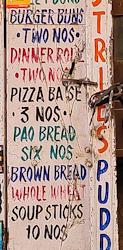Burger buns two numbers, pizza bases three numbers
THERE ARE MORE people who make use of the English language in India (over 130 million) than in the UK (53 million). The language is a ‘lingua franca’ in India. However, like North American English, Indian English differs in some details from British English. For example, whereas an Indian says “I will do the needful”, a Brit says “I will carry out what is required ” or “I’ll do it”

While strolling through the market area of Jaisalmer today, we passed a bakery that listed its wares in English on a board outside the shop. This notice employed a commonly occurring Indian use of the word ‘numbers’ (abbreviated as ‘nos’). Amongst the produce that was sold in the store were the following: “Burger buns two nos”, “pizza base 3 nos.”, and “soup sticks 10 nos” What this means is that the shop sells burger buns as a pair, pizza bases in threes, and packs of 10 soup sticks.
You can often find the same usage of the word ‘number’ in restaurant menus. For example, “pakoras (6 numbers)” means that the portion you will be served will include 6 pakoras.
This particular Indian English usage of the word ’number’ is widespread, as is the usage of ‘avail’ as a verb. In India to avail something means to take advantage of an opportunity or something offered, whereas in literary English it means to help or to assist, as in, for example, “no amount of struggle availed him”.
The English language is one of a few useful benefits of the centuries of British rule in India. Yet, it has undergone some interesting adaptations by its users on the Subcontinent. I have described a few of these, but there are plenty more.



